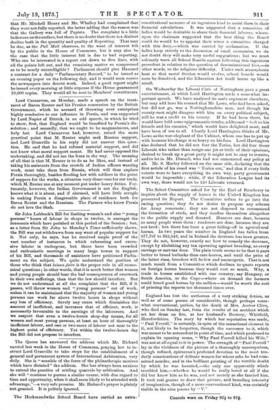England has lost the authoress of a very striking fiction,
as well as of some poems of considerable, though perhaps some- what conventional, pathos, by the death of Mrs. Archer Clive, who died on Sunday last, from the results of an accident which set her dress on fire, at her husband's Rectory,- Whitfield, Herefordshire. The story by which her reputation was made, "Paul Ferroll," is certainly, in spite of the sensational element in it, not likely to be forgotten, though the successor to it, which was meant to be antecedent in point of time, and which professed to explain its opening scene, "Why Paul Ferroll killed his Wife," was not at all equal to it in power. The strength of" Paul Ferroll" lay in the vividness of the picture of a thoroughly unscrupulous, though refined, epieurean's profound devotion to the most ten- derly conscientious of delicate women for whose sake he had com- mitted murder, and in the brilliant painting of the terrible doubt by which he was haunted,—the only one apparently which troubled him,—whether he would be really loved at all if she did but know him as he was, and not merely as she fancied him. It took real genius to draw that picture, and brooding intensity of imagination, though of a more conventional kind, was certainly visible in the nine poems by "V."


































 Previous page
Previous page